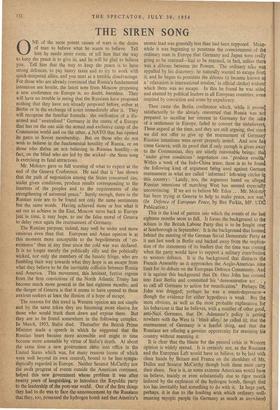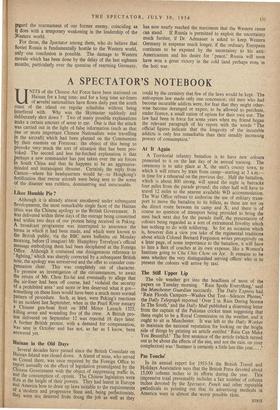THE SIREN SONG
ONE of the most potent causes of wars is the desire of man to believe what he wants to believe. Tell him he needs more room, or tell him that the way to keep the peace is to give in, and he will be glad to believe you. Tell him that the way to keep the peace is to have strong defences, to pay heavy taxes and to try to work with quick-tempered allies, and you start at a terrible disadvantage. For those who are already convinced that Russia's fundamental intentions are hostile, the latest note from Moscow proposing a new conference on Europe is, no doubt, harmless. They . will have no trouble in seeing that the Russians have proposed nothing that they have not already proposed before, either at Berlin or in the exchange of notes immediately after it. They will recognise the familiar formula: the unification of a dis- armed and ` neutralised' Germany in the centre of a Europe that has on the one side the armed and exclusive camp of the Communist world and on the other, a NATO that has opened its gates to Soviet membership. But on those who do not wish to believe in the fundamental hostility of Russia, or on those who thrive on not believing in Russian hostility—in fact, on the blind who are led by the wicked—the Siren song is exercising its fatal attractions.
Mr. Molotov gave us full warning of what to expect at the end of the Geneva Conference. He said that it ` has shown that the path of negotiation among the States concerned can, under given conditions, produce results corresponding to the interests of the peoples and to the requirements of the strengthening of universal peace.' Surely enough, there in the Russian note are to be found not only the same sentiments but the same words. Having achieved more or less what it set out to achieve in the East, Moscow turns back to Europe just in time, it may hope, to use the false moral of Geneva to delay once again the rearmament of Germany.
The Russian purpose, indeed, may well be wider and more ominous even than that. European and Asian opinion is at this moment more susceptible to the beguilements of ` co- existence' than at any time since the cold war was declared. It is no longer merely the politically silly and the politically wicked, nor only the members of the lunatic fringe, who are fumbling their way towards what they hope is an escape from what they believe to be the inevitable collision between Russia and America. This movement, this hesitant, furtive regress from the firm convictions of the North Atlantic Treaty has become much more general in the last eighteen months; and the danger of Geneva is that it seems to have opened to these anxious seekers at least the illusion of a-hope of escape.
The reasons for this trend in Western opinion are not simple and by the same token they are becoming more elusive for those who would track them down and expose them. But they are to be found somewhere in the following complex.
In March, 1953, Stalin died. Thereafter the British Prime Minister made a speech in which he suggested that the Russian heart became more accessible and might in time become more amenable by virtue of Stalin's death. At about the same time a new government came into office in the United States which was, for many reasons (some of which were well beyond its own control), bound to be less sympa- thrically regarded in Europe. Neither Senator McCarthy nor atomic lead was generally less than had been supposed. Mean- while it was beginning to penetrate the consciousness of the ordinary man in Europe that Germany and Japan were really going to be rearmed—had to be rearmed, in fact, unless there was a detente between the Powers. The ordinary lean wa$ appalled by his discovery; he naturally wanted to escape fro it, and he began to, postulate the detente (it became known a ` relaxation in international tension,' in official circles) withou which there was no escape. In this he found he was aide and abetted by political leaders in all European countries, some inspired by conviction and some by expediency.
Then came the Berlin conference which, while it prov satisfactorily to the already converted that Russia was no prepared to sacrifice her interest in Germany for the sake of a settlement in Europe, failed to convert the unbeliever a; These argued at the time, and they are still arguing, that since we did not offer to give up the rearmament of Germany Russian intentions were never properly tested. And now ha come Geneva, with its proof that if only enough is given awa to the Communists, they are utterly reasonable beings; tha ' under given conditions' negotiation can `produce results Within a week of the Indo-China truce, there is to be foun the following kind of argument being used against Germatl rearmament in what are called ' informed ' left-wing circles this country: ' Lately, too, the argument based on alleged Russian intentions of marching West has seemed especial! unconvincing. If we are to believe Mr. Eden ... . Mr. Moloto has been trying at Geneva to help to make peace, not war (In Defence of European Peace, by Ben Parkin, MP, UD Publication.) This is the kind of pattern into which the events of the last eighteen months seem to fall. It forms the background to the schism in the British Labour Party that is to be fought over at Scarborough in September. It is the background that loomed behind the meeting of the German Social Democratic Party a9 it met last week in Berlin and backed away from the implicaq tion of the statements of its leaders that the time was coming when the party would have to support a military contribution to western defence. It is the background that distracts the French Assembly as it approaches the Anglo-American timg limit for its debate on the European Defence Community. And it is against this background that Dr. Otto JOhn has crossed into East Berlin and committed his ` demonstrative act . to call all Germans to action for reunification:' Perhaps D John was drugged; perhaps he was a manic-depressive—• though the evidence for either hypothesis is weak. But the most obvious, as well as the most probable explanation fot his behaviour is that he believes, with a number of other good, anti-Nazi Germans, that Dr. Adenauer's policy is getting nowhere with the West (a ` blind alley,' he called it), that the rearmament of Germany is a fearful thing, and that the Russians are offering a genuine opportunity for reuniting hill country without rearming it. regard the rearmament of our former enemy, coinciding as does with a temporary weakening in the leadership of the Western world.
For those, the Spectator among them, who do believe that Soviet Russia is fundamentally hostile to the Western world, only one conclusion is possible. The damage to Western morale which has been done by the delay of the last eighteen months, particularly over the question of rearming Germany, has now nearly reached the maximum that the Western cause can stand. If Russia is permitted to exploit the uncertainty much further, if Dr. Adenauer is asked to keep Western Germany in suspense much longer, if the ordinary European continues to be exposed by the uncertainty to his anti- Americanism and his desire for peace,' Russia will soon have won a great victory in.the cold (and perhaps even in the hot) war.



































 Previous page
Previous page